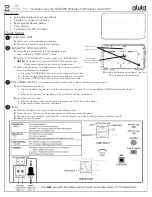
152
Appendices
Appendices
The tuning or pitch
of the keyboard or
song is off
Have you set transpose? (p. 73)
Are the settings for the “Temperament”
and “Stretch Tuning” correct? (p. 133)
Is the setting for the “Master Tune” correct?
(p. 136)
Effects cannot be
applied to Tones
It’s not possible to apply more than one
effect at the same time, so when a
performance has been recorded on multiple
tracks or when playing along with a song as
it’s played back, the desired effect may not
be applied.
A note doesn’t stop
playing
Have the Chord Tone and Bass Tone been
changed? (p. 128)
Some Chord Tone and Bass Tone notes may
be sounded continuously.
The Tone has
changed
During automatic accompaniment,
changing the Music Style automatically
changes the Tones and tempo of the upper
part of the keyboard to match the new
Music Style. If you want to change only the
Music Style without also altering the tempo
and Tone, check out “Changing Music
Styles Without Changing the Tone or
Tempo (One Touch Setting)” (p. 125).
When a performance made along with a
Music Files tune has been recorded,
recording the performance to button [1/
Whole] may make the Tones for buttons [3/
Lower] and [4/Upper] change as well.
Reverberation still
audible even with
Reverb turned off
Since the KR105’s piano sounds faithfully
reproduce the sense of spaciousness and
reverberation of an actual acoustic piano’s
sound, a certain amount of reverberation is
still perceptible, even with the reverb effect
deactivated.
In the upper range,
the sound changes
abruptly beyond a
certain key
On an acoustic piano, notes in the upper
one and a half octaves of the keyboard
continue to sound until they decay
naturally, regardless of the damper pedal.
There is a difference in the timbre as well.
Roland pianos faithfully simulate such
characteristics of the acoustic piano. The
range that is unaffected by the damper
pedal will change depending on the Key
Transpose setting.
Case
Cause/Remedy
A High-pitched
whine is produced
When listening through headphones:
Some of the more flamboyant and
effervescent piano tones feature an ample
high-end component, which may make the
sound appear to have metallic reverberation
added. Since this reverberation becomes
particularly audible when supplemented by
heavy reverb, you may be able to diminish
the problem by reducing the amount of
reverb applied to the sound.
When listening through speakers:
Here, a different cause (such as resonance
produced by the KR105) would be suspect.
Consult your Roland dealer or nearest
Roland Service Center.
The bass range
sounds odd, or
there is a vibrating
resonance
When listening through speakers:
Playing at loud volumes may cause
instruments near the KR105 to resonate.
Resonation can also occur with fluorescent
light tubes, glass doors, and other objects.
In particular, this problem occurs more
easily when the bass component is
increased, and when the sound is played at
higher volumes. Use the following
measures to suppress such resonance.
• Place speakers so they are 10–15 cm from
walls and other surfaces.
• Reduce the volume.
• Move the speakers away from any
resonating objects.
When listening through headphones:
Here, a different cause (such as resonance
produced by the KR105) would be suspect.
Consult your Roland dealer or nearest
Roland Service Center.
The automatic accompaniment doesn’t play
correctly
Can’t select a tone
or Music Style
Touch <Exit> several times to return to the
Basic screen (p. 19), and then select a tone or
Music Style.
Automatic
accompaniment is
not heard
Has the Balance knob been moved all the
way to the right? (p. 52)
Have you pressed the One Touch Program
[Arranger] button?
If the One Touch Program [Arranger]
button has not been pressed, only the
rhythm pattern is played (p. 42).
Is the 16-track Sequencer screen displayed?
(p. 99)
Chord Intelligence
can’t be used
Has Chord Intelligence been set to manual?
(p. 128)
Is the setting for “Piano Style Arranger”
active? (p. 51)
Case
Cause/Remedy
KR105.book Page 152 Tuesday, June 7, 2005 5:25 PM
















































